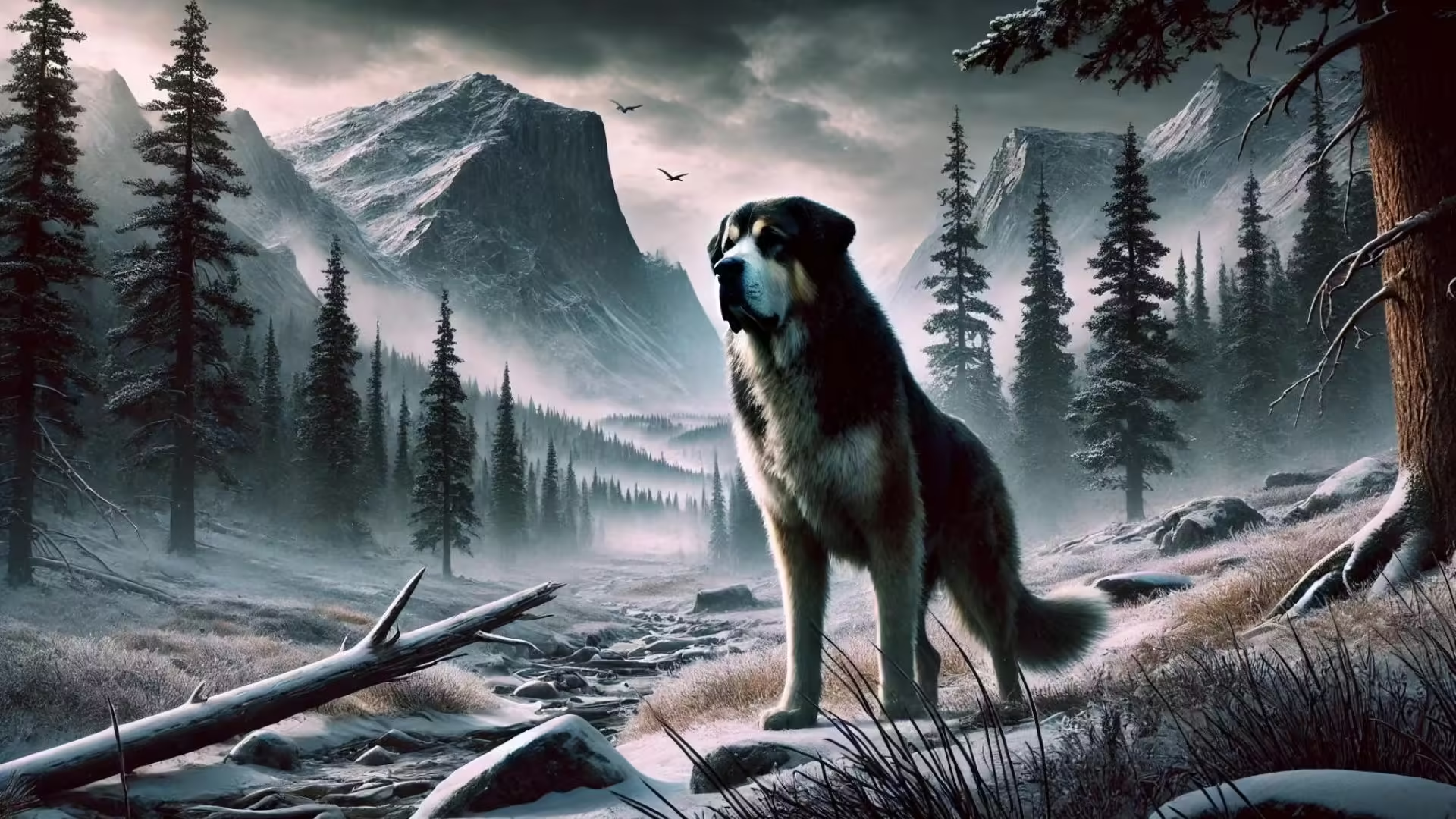Jack London’s The Call of the Wild is one of the most iconic literary works exploring the raw power of nature and the primal instincts within us all. Although often categorized as an adventure novel, this story reaches far beyond the typical tale of survival. It delves deep into the tension between civilization and the wilderness, examining how external environments can trigger profound internal transformations. By focusing on a dog named Buck, London masterfully weaves themes of instinct, survival, freedom, and the wildness within every living creature.
Buck’s Transformation: Civilization to Wild
At the heart of The Call of the Wild lies the journey of Buck, a domesticated St. Bernard-Scotch Collie mix, whose life is turned upside down when he is stolen from his comfortable home in California and sold into the harsh life of an Alaskan sled dog during the Klondike Gold Rush. Buck’s transformation from a pampered pet to a wild leader of a wolf pack mirrors the human struggle to reconcile societal norms with more primal desires.
As Buck is thrust into the wilderness, he must adapt quickly to survive. The civilized manners that defined his early life become irrelevant in the brutal, lawless environment of the wild. This transformation symbolizes a universal theme: the shedding of the trappings of civilization and the awakening of instinct. London uses Buck’s experiences to suggest that deep within every being lies an untamed, wild nature that can be reawakened under the right conditions.
The Wild as a Metaphor for Freedom
One of the most thought-provoking aspects of The Call of the Wild is its portrayal of the wild as a metaphor for freedom. For Buck, the wilderness offers not just physical freedom from his chains but also a release from the constraints of his previous life. In the wild, Buck finds true freedom, unbound by human expectations or societal rules.
This notion speaks to a broader human experience. Many people feel trapped by the structures of modern society, yearning for a more authentic existence that aligns with their inner nature. The wild, in London’s narrative, is not just a place but a state of being—a return to the core of who we are, stripped of all pretenses. Buck’s journey reflects the idea that true freedom is not necessarily found in the comforts of civilization but in the embracing of our raw, unfiltered selves.
Instinct vs. Learned Behavior: Nature vs. Nurture
London also explores the age-old debate of nature versus nurture. In Buck’s case, his instincts gradually override the domesticated behaviors he learned as a house pet. As the story progresses, Buck reconnects with the ancestral memories of his wolf heritage, which guide him through the challenges of his new life. The instincts that had been suppressed by civilization resurface, leading Buck to his ultimate role as a leader in the wild.
This concept extends beyond the story and into the realm of human psychology. How much of who we are is shaped by our environment, and how much is innate? London invites readers to ponder this question as Buck’s character evolves. Are we, like Buck, creatures who can shed the layers of societal conditioning and rediscover our primal essence when needed? Or do the structures of civilization irreversibly alter who we are at our core?
Survival of the Fittest: The Law of Club and Fang
Another significant theme in The Call of the Wild is survival. In the wilderness, Buck quickly learns that the only law is the “law of club and fang,” where strength and cunning determine survival. This brutal reality forces Buck to adapt or die, pushing him to tap into his primal instincts in ways he never had before. The harshness of the wilderness reveals the raw, unforgiving side of nature, where only the strongest or smartest can thrive.
This theme resonates with readers because it reflects a deeper truth about life. Whether in nature or human society, survival often requires us to adapt, fight, and persevere through adversity. London’s depiction of the “survival of the fittest” not only applies to Buck but also serves as a metaphor for the human condition—where competition, resilience, and adaptability are key to success.
The Call of the Wild: A Universal Human Experience
Although The Call of the Wild is written from the perspective of a dog, its themes are deeply relatable to the human experience. Buck’s journey from domestication to wildness symbolizes the conflict many of us feel between conforming to societal expectations and listening to our inner desires. The call of the wild is not just a call to nature but a call to self-awareness, authenticity, and freedom.
London’s exploration of instinct, survival, and the tension between civilization and wildness continues to resonate with readers today. In a world where technology and urban living often separate us from nature, The Call of the Wild serves as a reminder of our deep connection to the natural world and the instincts that lie within all of us. It challenges us to reflect on our own lives and the ways in which we suppress or embrace the wildness inside.
The themes of The Call of the Wild invite us to consider our own relationship with nature and our inner selves. Next time you find yourself longing for freedom or authenticity, reflect on Buck’s journey and ask yourself: What instincts have you suppressed, and what would it take for you to answer your own call of the wild?
Expand Your Vocabulary
- Primal Instincts:
Primal instincts refer to the basic, natural impulses that drive behavior, often related to survival and reproduction. In the article, Buck reconnects with his primal instincts as he adapts to life in the wild. In everyday language, we use this term when talking about fundamental, almost animal-like behaviors, such as “His reaction to danger was purely driven by primal instincts.” - Civilization:
Civilization refers to human society, its structures, and cultural norms. The article discusses how Buck sheds the constraints of civilization to embrace his wild nature. In common usage, civilization often refers to societal order and development, like “Modern civilization is built on technology and cooperation.” - Wilderness:
The wilderness is a natural environment that is uninhabited or barely touched by humans. In the story, the wilderness represents both danger and freedom for Buck. In everyday language, wilderness can describe any untamed or wild place, such as “They ventured deep into the wilderness for their camping trip.” - Metaphor:
A metaphor is a figure of speech where one thing is used to represent another. In the article, the wild is used as a metaphor for freedom. In daily life, we often use metaphors to explain complex ideas, such as “Time is a thief” to describe how quickly time passes. - Instinct vs. Learned Behavior:
This phrase refers to the natural tendencies (instinct) we are born with, contrasted with the behaviors we acquire through experience. In the article, Buck’s instincts gradually overpower his learned behaviors as a domesticated pet. In everyday conversations, this concept is often explored in relation to human development, such as “Is leadership an instinct, or is it a learned behavior?” - Survival of the Fittest:
Survival of the fittest is a phrase from Darwinian theory, meaning that those who are most suited to their environment are more likely to survive. The article applies this to Buck’s need to adapt to the harsh conditions of the wild. We use this phrase to describe competitive environments, such as “In the business world, it’s survival of the fittest.” - Transformation:
A transformation is a significant change in form or character. The article discusses Buck’s transformation from a domesticated dog into a wild leader. In everyday language, we talk about transformation in both physical and emotional contexts, such as “Her transformation after the fitness program was remarkable.” - Freedom:
Freedom refers to the state of being free from restrictions. In The Call of the Wild, the wild symbolizes Buck’s ultimate freedom. In daily conversation, freedom is often linked to personal or political independence, like “He finally found freedom after moving to a new country.” - Resilience:
Resilience is the ability to recover from difficulties. In the wild, Buck displays resilience as he faces numerous challenges and hardships. We use this term frequently in everyday life, especially when talking about overcoming obstacles, such as “Her resilience helped her rebuild her life after the tragedy.” - Authenticity:
Authenticity refers to being true to one’s self or nature. Buck’s journey into the wild represents a return to his authentic self. In everyday language, we might use this word to describe someone or something genuine, like “Her authenticity is what makes her such a trustworthy friend.”
Let’s Talk
- The Call of the Wild explores the tension between civilization and primal instincts. Do you believe that modern society suppresses our primal instincts? If so, in what ways?
- How do you think Buck’s transformation in the wild reflects the potential for change in all of us? Have you ever experienced a moment where you felt your instincts took over?
- The wilderness is portrayed as both dangerous and freeing. In your life, are there situations or environments where you feel a similar push and pull between risk and freedom?
- Buck’s journey is about rediscovering his authentic self. Do you think people today struggle to connect with their true selves due to societal pressures?
- The concept of “survival of the fittest” plays a major role in The Call of the Wild. Do you think this concept applies to modern life? If so, how does it manifest in today’s society?
- Nature vs. nurture is a recurring theme in the story. How much of who you are do you think is shaped by your environment, and how much is innate?
- Freedom, as represented in the wild, is a central theme in the book. How do you define freedom in your own life, and do you think it’s always tied to being free from societal expectations?
- The Call of the Wild suggests that under the right circumstances, we can revert to our more instinctual selves. Do you think this reversion is a good or necessary thing? Why or why not?
- Do you agree with the idea that survival requires not only strength but also the ability to adapt? How does this idea apply to challenges you have faced in your life?
- Buck’s resilience is key to his survival in the wild. Can you think of a time when resilience helped you overcome a difficult situation, and how did it shape who you are today?
Discuss these questions with friends, family, or in the comments section to reflect on how the themes of The Call of the Wild resonate with your own experiences and understanding of life.










0 Comments